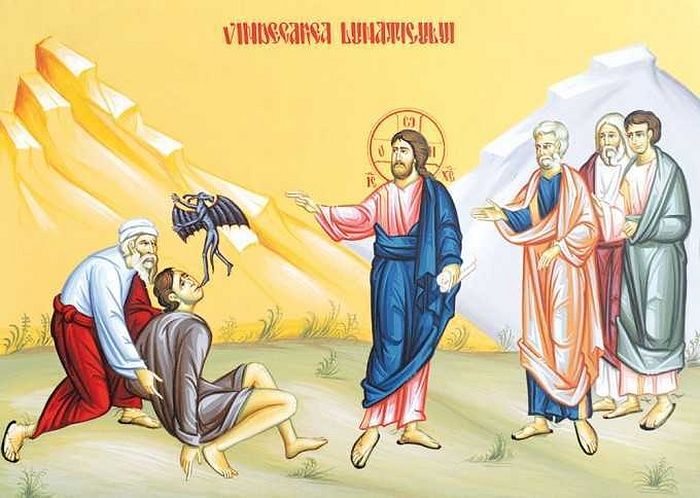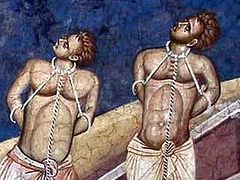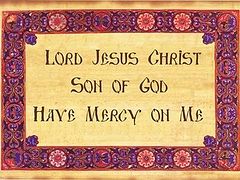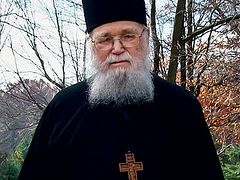Today we hear the story of the man who brings his son (an epileptic) to the Lord Jesus Christ for healing. The man, a devout and caring father, comes and falls on his knees before the Lord and he cries out with a familiar cry “Lord, have mercy!” This is the proper way to worry about our children and loved ones, not with fruitless anxieties, but with heartfelt prayer to God with the cry “Lord have mercy!” Often people who come to the Orthodox Church for the first time are quite amazed at the number of times they will hear us pray “Lord have mercy” at every service and especially at the Divine Liturgy. This is no accident but a purposeful habit that the Church, our mother, is trying to form within us.
This prayer is not simply to be said with our mouths, but with our hearts. It is not to be said only on Sundays during the Divine Liturgy, but every day and if possible, every waking moment of the day. This prayer found in passages such as this one, is foundational for our understanding of the Jesus prayer. This prayer is often spoken of by the early fathers of the Church as simply “the prayer.” The full Jesus prayer is said as follows “Lord Jesus Christ, Son of God, have mercy on me, the sinner.” Often this will be shortened to “Lord Jesus, have mercy on me.” An even shorter form is simply what we are already saying here every day “Lord have mercy.”
This prayer needs to be foundational in our lives. We build a life of prayer upon these words which are short, sweet and go directly to the point. The repetition of the Jesus prayer allows us to fulfill the teaching of St. Paul who tells us to “pray without ceasing.” So it is possible to pray in such a way, and this practice gives us a prayerful disposition, and connects us to Christ. This prayerful disposition makes it easier for us to pray at other times and to keep a warm connection with God as we go through our day.
Many of the fathers of the Church tell us that the ultimate power of the prayer comes from the repetition of the name of Jesus Christ. It is for us the holiest of all words. It is the very name of the word of God made flesh. It is the name above all names, and it is extremely powerful. This is why it is a very great and grievous sin to use the name of Jesus Christ in vain.
Speaking about the Jesus prayer, the holy elder Father Sophrony said that the monks he met while living on Mt. Athos, pray while “Their attention is concentrated on harmonizing their life with the commandments of Christ.” He continues saying, “According to ancient tradition, mind unites with heart through Divine action when the monk continues in the ascetic feat of obedience and abstinence (please note that the abstinence spoken of here is specifically for monks and those who are not united in holy matrimony. At times abstinence is also permitted within a marriage, as is spoken of by St. Paul in 1 Cor 7:5 when he writes “Do not deprive one another, except perhaps by agreement for a limited time, that you may devote yourselves to prayer; but then come together again, so that Satan may not tempt you because of your lack of self-control.) But continuing on, Father Sophrony writes “According to ancient tradition, mind unites with heart through Divine action (the grace of the Holy Spirit) when the monk continues in the ascetic feat of obedience and abstinence; when the mind, the heart and the very body of the ‘old man’ to a sufficient degree are freed from the dominion over them of sin; when the body becomes worthy to be ‘the temple of the Holy Spirit’.” Of course we know that one never actually becomes worthy of this, but the Holy Spirit comes as a gift.
Through the prayer we acknowledge that Jesus Christ is our master and the lord of our life. We acknowledge His true identity as the divine Son of God. Finally, we also recognize our fallenness, our sinfulness. It is both a prayer of acknowledging the Lord for who He really is, and for acknowledging who we really are.
We notice that the Lord is quick to respond to the cry of this desperate father. The Lord responds as one who takes a genuine interest in the problem and especially in the people involved. Glory to God for His compassion and love of mankind. He offers this same compassion and this genuine interest in each of us and our situations, no matter how difficult, no matter how complicated, no matter what we are dealing with. His powerful love is not only for those who lived 2000 years ago, who are remembered in the Gospel accounts. Christ is an unending fountain of love to those who fall on their knees and cry “Lord have mercy.” One does not even have to fall on his knees, so much as he has to bring his demeanor and his attitude low. This humble cry to the Lord cannot be ignored. No matter how often you’ve tried and failed, no matter how often you’ve sinned and fallen short, God can forgive and wipe away the stain of sin from your life.
The Lover of mankind goes beyond our limitations, and beyond our needs to supply more of His grace than we ever thought possible. But again let me remind you that this requires what we’ve already mentioned above, real humility and obedience to the teachings of Jesus Christ, and this is all necessary to have genuine faith. Without these, there can be very little genuine progress in our prayer life and in our general spiritual life. Without increasing our prayers, our repentance and fasting, we will be like the disciples in today’s passage, whom the Lord said were faithless. Perhaps we can each resolve to make a new start today and daily to call upon the name of Jesus Christ with this prayer and to couple this with repentance and a firm desire to obey all of the teachings of the Lord. These are just a few of the important steps that a Christian must take to be found as people of great and dynamic faith. And Glory be to God forever. Amen.








